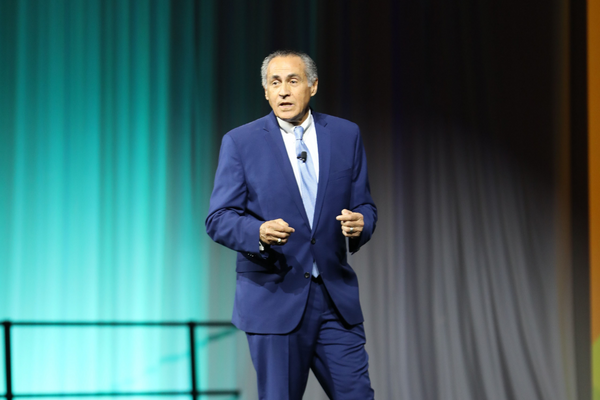Dan Domenech is leaving a distinguished career as one of the nation’s most prominent leaders in K-12 education. But he’s doing so, he told the 1st General Session audience at AASA’s national conference in San Antonio on Thursday, at a troubled time.
“I leave my position after probably three of the most difficult years that I have experienced in my 55 years in education,” he said near the outset of his 10-minute valedictory before he heads into retirement at the end of the month. “I could spend hours talking about the problems we have faced and will continue to encounter for years to come, but I would rather focus on the resilience of our public school systems, the commitment of all of you to be the champions for the children you serve.”
The association, which he is leaving at month’s end after 15 years as executive director, has risen to the needs of the moment. He contends AASA “has actively supported our superintendents and aspiring leaders in these troubled times.” He pointed to the significant growth in AASA’s series of professional growth cohorts, known as the Leadership Network and the Learning 2025 initiative, which includes more than 140 school districts “working to provide a student-centered, equity-focused, future-driven education for all of our children.”
From the conference stage, Domenech said public attitudes toward schools and educators changed dramatically during the COVID-19 pandemic. “Educators were perceived as heroes during the initial months of the pandemic. Parents learned how difficult it was to teach their child at home, let alone a classroom full of them.”
He said he believes the majority of parents remain supportive of their schools, noting that recent polls suggest most appreciate the school their children attend and the education they receive.
“Attitudes changed quickly when working parents wanted their children in school, or when they resented the mandate to wear masks in school or objected to recommendations to have their children vaccinated,” Domenech said. “Indeed, as the very factors that some parents objected to the wearing of masks and getting their children vaccinated contributed to increased in-person instruction, other factors began to kick in. Critical Race Theory, the banning of library books and textbooks found to be objectionable by some, the blowback against diversity, equity and inclusion now labeled as ‘woke’. The concerted and too often well-funded efforts to take over school boards and implement divisive agendas.”
Such factors have led to abusive behavior at school board meetings with superintendents and their families threatened. This has resulted in the unprecedented turnover in the superintendency, with many leaving their jobs early while others have been bought out of their contracts or retired.
This toxic environment may have contributed to the current teacher shortage, he said. “But most of our teachers have persisted and continue to be in the classroom, in spite of larger classes, increased behavior problems among students, the need to attend to the social and emotional needs of students, and the possibility that a school shooting could occur anywhere, any time.”
At that point, he recognized his daughter Jillian in the audience, a teacher in Fairfax County, Va., where Domenech once worked as superintendent. He called her “one of those teachers that, because she loves her kids, continues to do the job.”
(Jay Goldman is editor in chief of Conference Daily Online and editor of AASA’s School Administrator magazine.)

